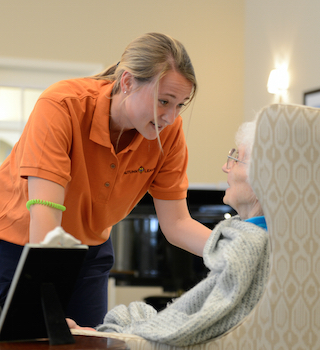
Certified nursing assistants caring for seniors should be required to undergo 120 hours of training, and their compensation should reflect the skills and knowledge required to perform high-quality work, assert the authors of an opinion article published online Monday by JAMA, the journal of the American Medical Association.
The piece — by John W. Rowe, M.D., the Julius B. Richmond Professor of Health Policy and Aging at the Columbia University Mailman School of Public Health; Terry Fulmer, Ph.D., RN, president of the John A. Hartford Foundation; and Linda Fried, M.D., dean and the DeLamar Professor of Public Health Practice at Mailman and senior vice president of Columbia University Medical Center — was one of several arising from the efforts of 19 workgroups that met earlier this year as part of the National Academy of Medicine’s “Vital Directions” initiative, which seeks to frame a health policy agenda that could gain bipartisan support.
Rowe and colleagues studied eldercare challenges and found that compensation plays an unmistakable role in shortages across the eldercare workforce. CNAs and personal care aides made median wages of $12.06 and $9.83, respectively, in 2014, they noted, citing 2016 Bureau of Labor Statistics data. Those low wages, combined with inadequate training and supervision and the perception that the positions are “dead-end” jobs, lead to recruitment and retention issues, the authors added.
And eldercare compensation challenges extend beyond direct care workers to social workers, nurses, geriatricians and other healthcare workers and public health providers, Rowe and co-authors said. “For instance, the income of geriatricians is well below that of general internists or family physicians, despite the additional training required to become certified in geriatrics,” they wrote. “Nursing also has a shortage in geriatrics; less than 1% of registered nurses and less than 3% of advanced practice registered nurses are certified in geriatrics.”
Their additional suggestions to strengthen the eldercare workforce:
- Healthcare professionals should be required to demonstrate competence in the care of older adults as a criterion for licensure, certification and maintenance of certification.
- Reimbursement for clinical services delivered to older adults should be enhanced for practitioners who have certified expertise in geriatrics.
- Graduate medical education payments should be extended to apply to training of public health physicians and nurses studying geriatric care and health promotion.
- State and the federal programs should be established for loan forgiveness, scholarships and direct financial incentives for professionals who specialize in geriatrics.
Strengthening the eldercare workforce is one of four areas that “require immediate attention and will yield significant benefits” regarding the health and healthcare of older adults, Rowe, Fulmer and Fried said. The other three areas:
- Coordination of care for those with multiple chronic conditions. “Prominent” opportunities exist to develop new modes of care for the “neglected” areas of long-term care, preventive medicine and palliative care, according to the authors. Also, progress under the Elder Justice Act could be furthered to help prevent elder abuse and neglect, they said. First, however, restrictions related to reimbursement and the sharing of data and responsibility among organizations and clinicians must be overcome.
- Social engagement of older adults. Public and private programs should be improved to encourage older adults to remain in the labor force or to volunteer, for the benefit of their health and well-being, the authors stated. Specific efforts toward this end, they said, could include offering on-the-job and community college training programs for middle- and later-life workers transitioning to new types of jobs; making older workers less costly for employers by having Medicare be the primary payer of health insurance claims for all older workers; and re-engineering volunteer programs such as Foster Grandparents, Retired and Senior Volunteers, Senior Companions, Experience Corps to serve more people.
- Advanced illness and end-of-life care. Evidence-based approaches are available to improve the care received by people with advanced illness, especially those near death, the authors wrote. “Among the prominent opportunities to strengthen advanced illness and end of life care are payment for care tailored to the complex needs of those with advanced serious illness near the end of life; assurance of skilled palliative care for those with advanced serious illness, wherever they receive care; establishment and payment for standards for advance-care planning that are measurable, actionable, and evidence-based; and appropriate training, certification, or licensure requirements for those who provide care for patients for advanced serious illness as they near the end of life,” they said.
NAM also hosted a symposium Monday to discuss the papers that resulted from the workgroup efforts. A lengthier discussion paper with the same title as the JAMA article — “Preparing for Better Health and Health Care for an Aging Population” — available on NAM’s website, also lists as additional authors Robyn Stone, DrPH, executive director of the LeadingAge Center for Applied Research and senior vice president of research for LeadingAge; James Jackson, Ph.D., of the University of Michigan; Mary Naylor, Ph.D., RN, of the University of Pennsylvania; William Novelli of Georgetown University; and Jay Olshansky, Ph.D., of the University of Illinois at Chicago. They are listed as “additional contributors” in the JAMA paper.



